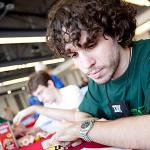
This is the VOA Special English Education Report.
Last month, students from 103 universities in 88 countries took part in an international computer programming contest. The Battle of the Brains took place in Harbin, China. Three-person teams from each school had five hours to solve 11 real world problems.
Jerry Cain coached the team from Stanford University in Palo Alto, California. He says the problems involved, among other things, paperweights, robots, castles and lakes.
JERRY CAIN: "One of the programming problems was try to figure out how to break an arbitrary chocolate bar into a certain number of pieces of a certain number of sizes and to do it as quickly as possible. And that's probably the simplest of all of them."
The students first listed the problems in order of difficulty. Then they figured out the requirements of each. They designed ways to test their solutions. And they wrote the needed software systems. Even the winning team from Shanghai Jiaotong University in China was not able to solve all the problems within the given time limit. Stanford's team solved five problems and finished in 14th place. Stanford was one of 21 American universities that took part in the contest this year.
The official name of the Battle of the Brains is the ACM International Collegiate Programming Contest. It began in 1970 at Texas A and M University. The contest quickly became popular in the United States and Canada. It developed and grew as more and more schools took part in local and area contests.
The first final competition was held in 1977 at the Association for Computer Machinery Computer Science Conference.
Today, a network of universities holds area competitions that send the winners to the world finals, now organized by IBM.
Contest spokesman Doug Heintzman says the world champions receive prizes and scholarships. They are also guaranteed an offer of employment or internship with IBM.
DOUG HEINTZMAN: "We've had past world champions that IBM has gone and employed in our Zurich research laboratory and are now working on some of the leading edge materials in science and physics. We have a world finalist from China who's been working on the Watson Supercomputer that in the near future will be playing Jeopardy against the best Jeopardy players in the world. So this competition is an opportunity to be recognized and to be recruited by some of the top technology and research firms around the world."
And that's the VOA Special English Education Report, written by Nancy Steinbach, with reporting by Faiza Elmasry. You can read all our reports and send comments to our newly re-designed Web site at voaspecialenglish.com. I'm Barbara Klein.
Studies link girls' sports to gains in life
8 US states to test high school changes
An English test, and a warning
Students' writing and the web: motivator or OMG?
(來(lái)源:VOA 編輯:陳丹妮)
